Silver, Bitcoin, and the Transformation of the U.S. ETF Market
Explore the transformative journey of Bitcoin ETFs in the U.S. ETF market, outshining silver and challenging gold
 Miyuki
Miyuki
Source: Dante by the Lethe River
If he really only wanted to "cut leeks"... that would be great.
Today I want to talk about Trump, who is about to take office. He chose to issue Memecoin named after himself on the eve of his inauguration. As seen in public reports, the coin has soared by more than 20,000% in a short period of time, and the current total market value exceeds 20 billion US dollars.
To be honest, it took me a whole day to be sure that this was not Fake News, as Trump often said, because I think this matter is too ridiculous. An incoming US president chooses to issue his own Memecoin on the eve of his inauguration? The effect of this is no less than that of a nun with both good morals and art and devout faith who chose to announce that she would go into the sea to make a small movie before being canonized by the Roman Catholic Church. I once doubted whether Trump was going to do it.
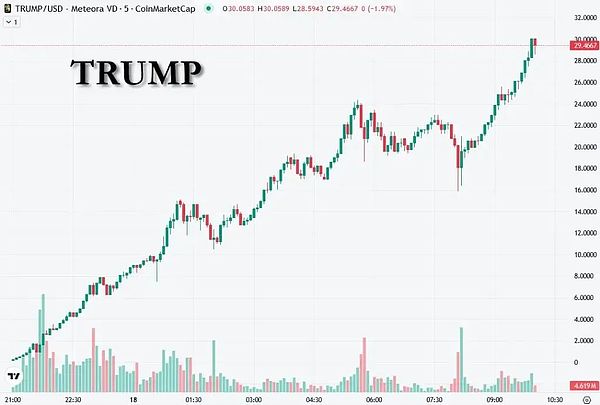
But after careful consideration, I feel that he may indeed have his own plan - but this plan, if it really succeeds, is likely to push the future of the United States and even all mankind into an unknown, high-risk abyss.
Please allow me to use a long article to analyze for you the logic of Trump's actions and the costs and risks that will be paid.
Before I officially start writing the article, I would like to apologize and explain to the two groups of readers that this article will definitely offend.
The first wave of readers are die-hard Trump fans in China.
If you are my old reader, you should know that I am an author who has always been friendly and gentle to Trump in the simplified Chinese self-media circle. Many of my first batch of readers are Trump's sympathizers or even die-hard supporters. But I think that sympathizing with and supporting Trump is fine, but it must not become a cult of personality. If you support Trump to the end and come up with a "whatever Trump approves, we firmly support; whatever Trump opposes, we firmly criticize". What is the essential difference between your support for Trump and the various extreme cults of personality that you hate and oppose? It is not only a deviation from the liberal conservative concept that supports Trump, but also the greatest betrayal of the concept of democracy and the rule of law in modern society.
What we believe in and follow is the concept and system, not and should never be a person. This truth is even higher than all ideological disputes. Those who do not recognize it do not have modernity. In the Water Margin world, the black silk Li Kui who kills people when Song Jiang asks him to kill people and chops children when he asks him to chop children is more suitable for his image.
The second wave of readers is probably the legendary "big guys in the currency circle".
In this article, I will tend to deny the positive value of meme coins (note, only meme coins, not all encrypted digital currencies).
But even if I say it so carefully, I guess there will still be people who play with coins and criticize me - how dare you say that? I can tell you don't understand economics!
There is no way, I'm already on board, and the interests are related. I generally don't deny the value of meme coins, just as I generally don't advise friends who have bought "silver combs" or "chicken blood jade" and other specialties at high prices after traveling to a certain place in the southwest to tell them directly: this broken thing is not worth much money.
But I still feel very magical about this inevitable accusation - when did it start? Recognizing meme coins, copycat coins, and air coins has become a symbol of understanding economics?
I think this accusation is a typical logical fallacy. If you don't play and are not sure, you don't understand? According to this line of thought, a person who criticizes drug use can also be characterized as not knowing how to enjoy, a person who criticizes prostitution can be questioned as a eunuch, and if the followers of the People's Temple or Aum Shinrikyo were to come back to life, they could also criticize those who condemned them for killing innocent people and committing suicide as "not knowing what the true God is at all."
I may have said this too much, but I want to emphasize that any effective discussion is not achieved by accusing others. In this article, I will list the reasons why my overall evaluation of Memecoin tends to be negative. If anyone can refute these reasons with reason and evidence, please leave a message to refute.
But I don't accept any accusation that says "you don't understand".
The two easiest hats in this world are "you don't understand" and "you have ulterior motives" - in other words, the legendary "either stupid or bad".
I always suspect that the people who always like to say this are actually the ones who are either stupid or bad.
Okay, the stacking is done. If you accept my two cognitions above, then I will take you on a journey of thinking.
Here I must first popularize science for friends who don’t understand this industry at all. Although the memecoin issued by Trump this time is a digital cryptocurrency like Bitcoin. But the issuance logic of the two is essentially different.
To make an image metaphor, Bitcoin is more like gold in the real world. Its total issuance is based on its mathematical model bound by natural mathematical laws. In other words, even Satoshi Nakamoto, who first proposed and issued Bitcoin, could not decide how many Bitcoins to issue. The generation of Bitcoin is determined by countless "mining machines" around the world that mine through computing power.
But memecoin is not like that. Strictly speaking, memecoin is not even worthy of being called a coin. It is just a digital private stamp, or a digital commemorative medal. How many meme coins are issued depends entirely on the "coin owner" who issues them. The coin owner is the only "mine" and manufacturer of meme coins.
In fact, meme coins were originally just a joke of Internet geeks. For example, Dogecoin, issued by Billy Markus and Jackson Palmer in 2013, has the famous emoticon Shiba Inu as its mascot. The issuer of the coin is almost telling you that we are joking, and those who are willing to buy this coin are giving money to our creativity.
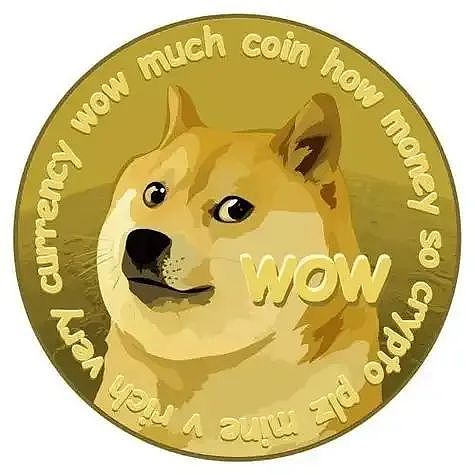
However, in the craze of "everything can be speculated" in the Internet circle, a very small number of meme coins unexpectedly continued their trading value.
To this day, the issuance and flow of meme coins are still highly similar to online gambling - issuers and traders need to first exchange a certain number of solana (a voucher) with US dollars on a certain website, register their own meme coin wallet, and then they can start trading or issuing coins. The website will not conduct an effective review of the issuer's qualifications for issuing coins.
So in theory, everyone (even if you don't need to be a person, even if you really bring a Shiba Inu) can issue "coins" on this platform. The value of meme coins after they are issued depends entirely on how many people are willing to pay for them - in other words, the value of meme coins depends entirely on how large a fan group it can establish a "value consensus", and then depends on who its promoters are. It is a pure means of cashing in celebrity popularity for arbitrage.
Does it sound like meme coins are not like a currency, but more like autographed photos, private stamps or commemorative medals that idols sent to fans in the past? Yes, leaving aside the fancy technical packaging floating on the surface, the essence of meme coins is such a thing. It is different from Bitcoin, and has nothing to do with underlying technology or decentralization. Even the issuance mechanism of meme coins is exactly the opposite of Bitcoin. It is more centralized than traditional currencies, and is centered on the issuer.
Highlight the key points, which are very important and will be used later.
For this reason, on the Sol Chain platform where Trump announced the issuance of coins this time, millions of meme coins are announced to be issued every year, but only one in ten thousand can survive the first month of the issuance and still have trading value (that is, if you want to sell the meme coins in your hand, there are still people willing to buy them). 99.9999% of meme coins are essentially a fool's game of passing the parcel and online gambling.
In summary, compared with real currency, meme coins do not have any qualifications to become a real currency.
First, there is no reserve when it is issued. Although a few meme coins have promised to exchange their meme coins with holders at a one-to-one ratio if they fall below a certain issue price, no fool has really done so so far, and all issuers have finally chosen to cash out and run away.
Second, it does not have a central bank to effectively control and supervise it.
Whether meme coins will have the problem of "rat warehouses" and whether the coin owners are ready to cash out and run away completely depends purely on the coin owners' personal mood and conscience. In the face of huge profit temptations, no meme coin issuer has been able to survive for more than three years without completely cashing out. Facts have proved that human consensus and conscience have not progressed to the point where the central bank's regulatory system can also be "decentralized", and the value of a currency can be maintained by a "gentleman's agreement" between an internet celebrity and his fans. Don't take a postgraduate entrance examination in human nature.
Finally, and most importantly, it is not naturally scarce like traditional currencies or even Bitcoin.
The number of traditional currencies issued must be anchored to its reserves, and over-issuance will cause hyperinflation. The number of Bitcoins issued is even more anchored in mathematics. Unless God makes 1+1 no longer equal to 2, no one can over-issue Bitcoin.
But where is the scarcity guarantee of meme coins? None, it all depends on the mood of the coin owner.
For example, Trump announced that his Trump coin would be issued 200 million first, and then 800 million in succession, with a total of 1 billion. This number is purely based on his own mood and character.
This is why most meme coin owners choose to cash out and run away at a certain point - human nature cannot withstand the postgraduate entrance examination without rigid constraints.
And I think what King Tong said about issuing coins this time is also a clear card. Pay attention to his tweets. I issue this kind of coin to "celebrate" our victory.
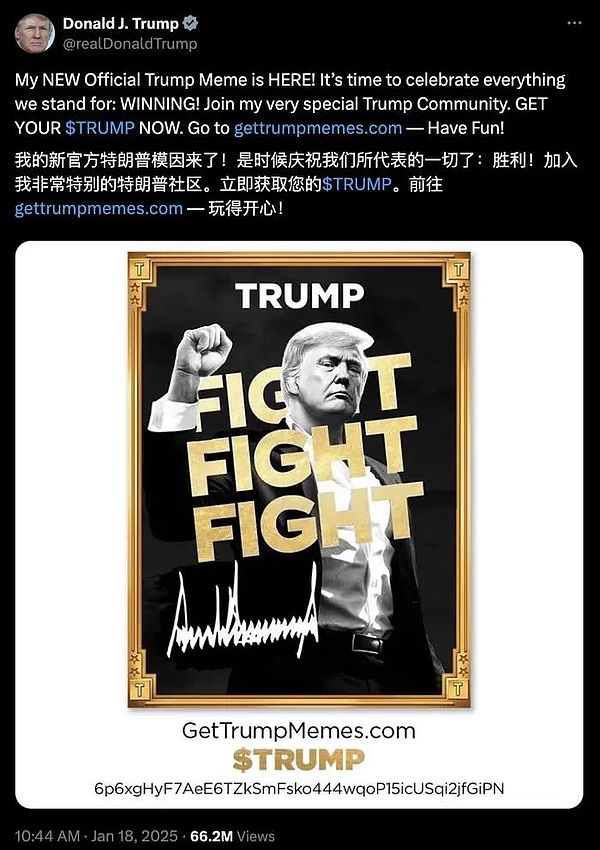
What should be issued when celebrating? Autographed photos, commemorative medals.
When have you heard that a country issued a certain amount of legal currency to celebrate something?
Even if it really happens, such a country is basically almost finished.
So memecoin is not a currency at all. Its nicknames of copycat coins and fake coins actually reveal its essence.
But with this analysis, a question arises-Why does Trump, who should have seen through the attributes of memecoin, still insist on issuing memecoin?
Uncle Chuan, who is not short of money, will not be like those low-end Internet celebrities, just to "cut another wave of leeks" and cheat some money, right? If so, he should cut it four years later.
Of course, he is not. The ambition is huge - so huge that when Americans recall this several years later, they may hope: Uncle Chuan, you really just wanted to make some money... that would be great! 2. Does Trump just want to "make money"? Here I have to dispel a rumor for Trump. After this incident, many people in the simplified Chinese Internet circle spread the rumor that "Trump issued a currency and made a huge profit (even "cashed out") xxx billion US dollars". This statement is inaccurate and even ignores the facts in order to attack Trump. Whether it is 24 billion US dollars or the latest hundreds of billions of dollars, it refers to the total market value of the "Trump currency" currently issued. If we use the common sense of stocks, we will know that the total market value cannot be directly equivalent to the amount of "cashing out" or "huge profits". A family with a million does not count. If Trump really intends to follow the example of some internet celebrities who are eager for quick success and cash out all the "Trump coins" in his hands, it will be similar to the "smashing" of stocks. The value of Trump coins will shrink rapidly, and his arbitrage space will shrink significantly along with his own reputation. Although the amount of money cashed out will be huge, it will be far lower than the current market value of Trump coins.
And to be honest, Lao Chuan has his own industry. He is not an ordinary internet celebrity who is poor and eager to cash in his reputation. It is ridiculous to attribute his coin issuance to how much money he earns for retirement. According to statistics in 2024, Trump's total assets are as high as 3.2725 billion US dollars.
May I ask, if he really spends 3.2 billion US dollars, how different is it from the rumored 24 billion US dollars he "earned" this time?
So it is superficial and ridiculous to rush to say that Trump "earned" hundreds of millions of dollars.
It's ridiculous like an old farmer imagining that he will become an emperor in the future, and then "all the feces in the village will be under my control".
With the heart of a low-end internet celebrity, I can judge the belly of Uncle Chuan. It's quite funny.
Why does the old Trump, who is not short of money, want to issue coins again?
I think, based on the current information, he should be aiming to kidnap or privatize the campaign funds of the Republican Party.
Campaign funds are the blood of the operation of the two-party system in the United States. The Republican and Democratic parties in the United States fight each other or within each other, and in essence, they are fighting for money.
The just-concluded 2024 US election broke the record again and became the most expensive election in US history. The two parties spent a total of 15.9 billion US dollars. This order of magnitude is actually the size of the market value of "Trump Coin" that can really be "used".
But the wool comes from the sheep. The campaign funds of the two parties are ultimately collected from voters or industry giants who support them. However, how to collect, manage and spend this money has always been the highlight of determining the distribution of power within the Republican and Democratic parties.
I remember that when Hillary and Trump ran for election in 2016, the Democratic Party had a very intriguing internal scandal. At that time, Obama, who was about to step down, had a list of major funders when he participated in the campaign. According to the traditional rules of the Democratic Party, Obama should have handed over this crucial "financial list" directly to the "successor" Hillary during the preparation of the campaign.
But Obama didn't do that! His choice was to hand over the list to the Democratic Party Federal Headquarters, and then the party headquarters handed the list to Hillary.
This delayed a lot of things. Hillary lost to Trump that year, and Obama had a share of the blame. The two were quite unhappy later.
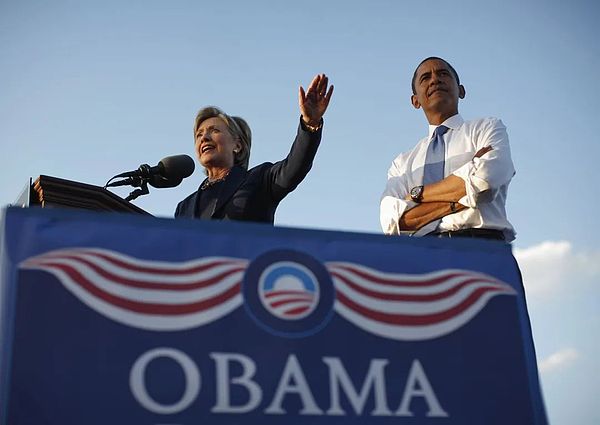
But why did Obama have to do this? There are many explanations for this.
Some people say that this reflects the long-standing feud between the Obama family and the Clinton family, and Obama is actually very reluctant to endorse Hillary's fundraising with his own reputation.
But some people also say that Obama's move is an attempt to end the long-standing bad habits of the major families in the Democratic Party privately granting the "fundraising rights" and secretly trading, and to end the "godfather" tradition of the Democratic Party with families, bosses, and factions as the banners, which is very similar to the New York gangs.
But no matter what, whoever controls the "fundraising rights" is the boss, and it is the lifeline of whether the party can choose the candidate this time.
This truth is common in both the Republican and Democratic parties.
On the Republican side, after being betrayed by the Republican establishment in the "Capitol Hill Fire" incident in 2021, Trump, who made a comeback in 2024, has been obsessed with trying to transform the traditional Republican Party into a MAGA party loyal to him. And he was actually close to doing this last year.
The biggest sign of Trump's success is that the campaign funds raised by the Republican Party in the 2024 election will no longer go into the account of the Republican Party as in the past, but into the private account of a Trump campaign team. In this way, how to spend the campaign money, what strategy to use for publicity, who to invest in, and who not to invest in, all depend on Trump's personal signature.
This change. As a result, in the 2024 campaign, all Republican campaign activities will not have projects that Trump considers "unnecessary" or even contradicts him as in 2020.
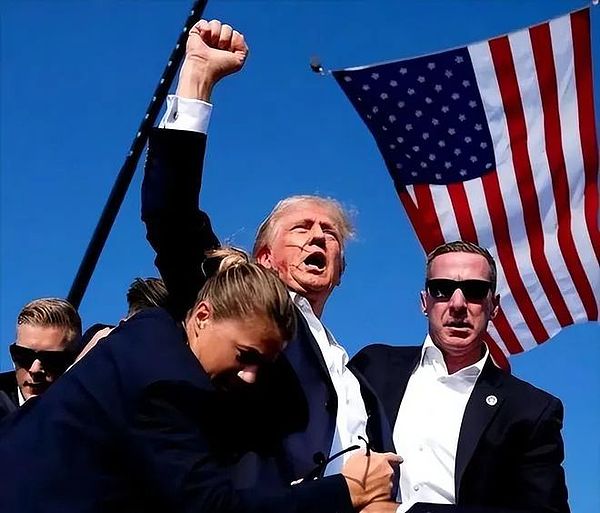
It has to be said that he spent his money wisely than the Republican establishment.
And you can imagine that if this model continues in the future, even if Trump is limited by his term and cannot participate in the next election in four years, the "successor" introduced by the Republican Party must come from Trump's team, or the "MAGA Party".
But how to ensure that this "ideal future" is realized?
The answer may be - Trump Coin.
We have analyzed the first part of the article. Meme coins (this word is too difficult to type, so let's call them meme coins in the future) actually have no actual value. In the past, they have only been used to monetize the influence of Internet celebrities, "cutting another wave of leeks and running away."
But when it comes to Trump, he may develop a different use of meme coins - Trump may use it to "dilute" the enthusiasm of voters for the Republican Party, which only broke out during the election period in the past, and transform it into long-term support and worship for Trump personally.
Let's put it in a more popular way:
If you are a center-right or right-wing voter in the United States, agree with the ideas of the Republican Party and basically agree with Trump's propositions, then the main means for you to express your support for the Republican Party and Trump in the past can only be to donate to the party account during the election, and at most register as a volunteer to canvass votes in person.
But once Trump's Trump coin came out, the situation changed. Now as long as you have right-wing enthusiasm and want to shout "Great America, Trump King!" or "Make America Great Again!", you can immediately log in to the sol chain, use the real money on hand to buy a few Trump coins, and then tell yourself that I support Trump with practical actions!
In this way, this part of the support is conveniently solidified by Trump coins.
And the enthusiasm of American right-wing voters was digested (or more accurately, "stored") in peacetime.
But please note that the ultimate beneficiary of this digestion and storage is no longer the Republican Party, but Trump himself.
Four years later, when the Republican Party needs to use this energy to organize the campaign, they will find it difficult to raise money using traditional fundraising methods. Supporters will say, I have already bought Trump coins with the money! At that time, the Republican Party will have to beg Trump, who has already "stored" the funds for American right-wing support in advance.
Whether to give this money and to whom specifically? This depends on the face of the "Trump Emperor".
We can even make a more extreme assumption (although based on existing economic common sense, I currently think this assumption is too sci-fi):
If Trump coins do not return to zero value like ordinary meme coins after four years, but are still circulated at a high transaction value. What will happen then?
The conclusion is that it may really become a kind of "pass token" for the allocation of campaign funds within the right-wing political groups in the United States. -
For example, the words and deeds of a candidate for a congressman in a certain place are deeply praised by Trump. Good work is a reward! Then Trump can give him tens of thousands of "Trump coins" and let him exchange them with right-wing supporters for campaign funds, and maybe he will be successfully elected as a congressman.
If this assumption really becomes a reality, it means thatTrump will not only helm the financial power of the Republican Party in the four-year US presidential election, but also control the financial power of congressmen and governors in various states of the United States, and even the financial power of the right-wing media in the usual propaganda.
This will be a terrifyingly detailed control, and its mobilization and dictatorship will be something that no president of the United States has ever had.
So Trump's vision is vicious. As analyzed in the first part,meme coins are fundamentally different from Bitcoin. They are not decentralized, but are more centralized than traditional currencies. Trump saw this and chose this current joke to try to fulfill his ambition.
The emperor of ancient Rome printed his portrait on the gold coin, which was just a possession of the name of monetary sovereignty. In fact, the Roman emperor had no way to control and restrict the flow of political funds.
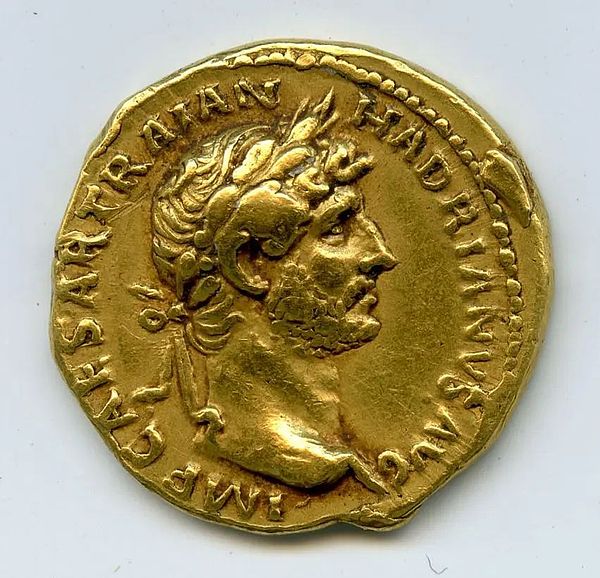
But Trump's "Trump Coin", once it is done, will really have an unprecedented terrifying control over American politics.
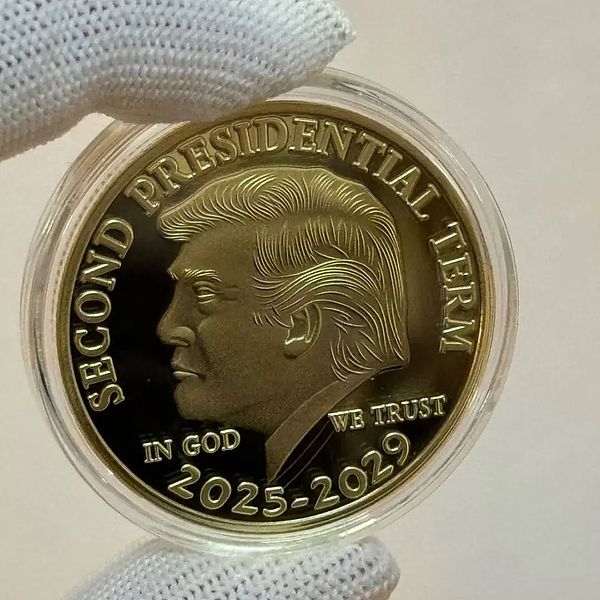
However, someone will always pay the price for the practice of any strongman's ambition.
We have to ask, what is the price that the United States will pay for Trump's doing this?
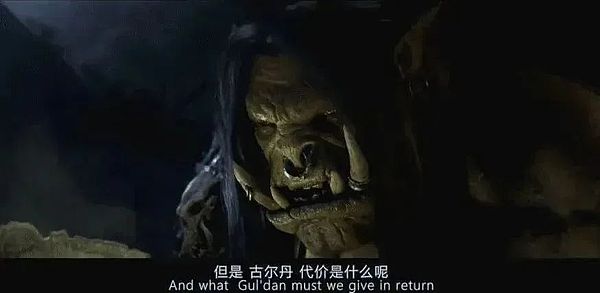
3. The "Stick of Marius" that alienated the United States
In the history of ancient Rome, there is a famous "Stick of Marius". Historians say that it was the stick of Marius that pried the transformation and alienation of Rome from a republic to an empire.
Roughly speaking, this period of history happened like this - Ancient Rome originally practiced a citizen soldier system that combined soldiers and farmers. Roman citizens usually farmed and did business. Once a war broke out, they had to abandon their livelihoods, provide their own weapons and food, and participate in defending their country.
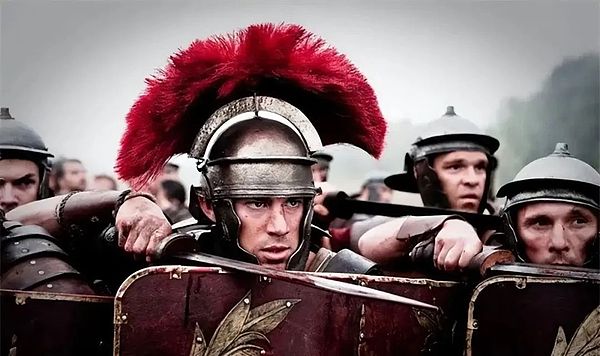
However, as the intensity and duration of Rome's war against foreign races gradually increased and intensified, the citizen soldier system gradually became unable to adapt to the development of the war. So after the tragic Second Punic War and the Jugurtha War, the consul Marius promoted the "Marius Military Reform" named after him.
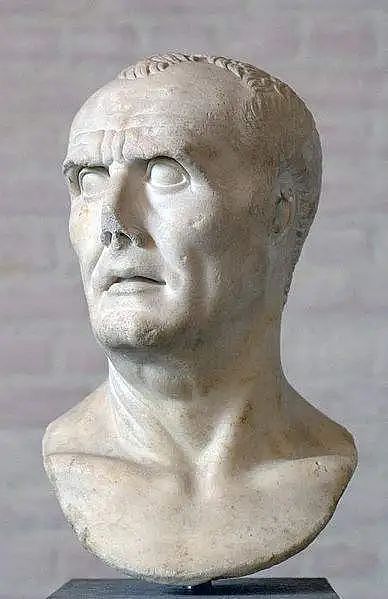
Generally speaking, the content of the Marius Military Reform is to transform the original citizen conscription into professional recruitment, stipulating that all voluntary and qualified Roman citizens, including those without property, can enlist in the army. The state directly allocates funds from the fiscal and taxation and hands them over to the governors of the provinces or the wartime Dictator, who purchases weapons or converts them into food and wages and distributes them to the soldiers under his command.
In the short term, the Marius Military Reform did greatly enhance the combat effectiveness of the Roman army, and Rome began to move towards a path of rapid expansion.
However, in the long run, the transformation of the Marius Army brought a fatal change to Rome, that is, the nature of the soldiers changed qualitatively - they were no longer simple citizens who were concerned about their distant hometowns, their wives and children, but became a group of mercenaries who could do anything as long as the general or governor gave them money, food, and promised rewards.
The financial power structure used by Rome to maintain the republic in the past has also changed - in the past, the citizen soldiers provided their own weapons and dry food to defend their country, and the entire financial system to support the army was chaotic and decentralized, but now the financial power concentrators who control the soldiers' food and become their breadwinners have become the governors of the provinces.
The soldiers even directly called the governor "Dominus (Latin: Lord, Master)" and were absolutely loyal to him personally.
So the governor became too powerful to be removed, so that the road to crossing the Rubicon River like Caesar later, returning to threaten the Senate, and becoming a lifelong Dictator was paved.
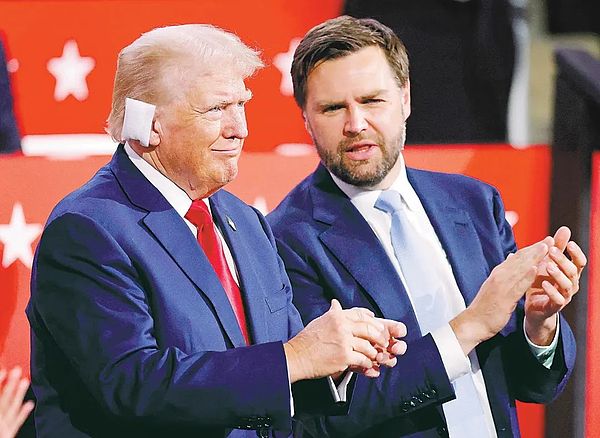
The name "Marius's stick" appeared at this time. Soldiers tied their supplies, military pay, spoils and other belongings to a stick and carried it. They jokingly called it "Marius's stick".
The property concerns of citizens were replaced, and the soldiers were only loyal to Marius's stick and Dominus, who provided them with food and clothing behind the stick.
This stick eventually pried open the fission of Roman history.
Comparing the past and the present, we will find that the "Trump Coin" issued by Trump this time is likely to become the "Marius's stick" that pries open the fission of American history.
Originally in the United States, although the reputation and influence of politicians like the president were huge, they could not be immediately discounted.
The president's appeal requires the assistance of a whole set of political parties and pro-party media, foundations, and especially their respective financial systems to mobilize their supporters. Transform it into political power for their use.
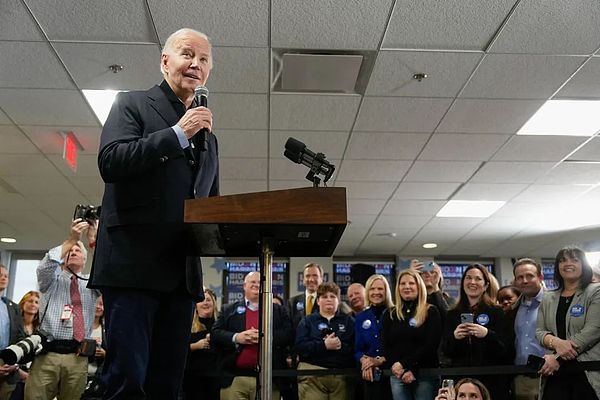
In this transformation process, the president's appeal will be constrained by this series of intermediary tools. A large number of social elites will ask in the process of completing this mobilization for the president: Is the president's call legal? Does it conform to American political traditions and norms? Does it conform to their own vital interests?
If not, this mobilization cannot be achieved.
This constitutes a strong objective constraint that prevents politicians from acting recklessly.
The most typical example is actually the "Burning of Capitol Hill" incident that occurred in 2021.
Although Trump was willing and able to mobilize his supporters to "rush the tower" during this process, he was unable to call on the government and the Republican system that theoretically obeyed him to give legitimacy and subsequent support to this rush to the tower, so the movement ultimately failed.
Even Trump's own Twitter account was banned after the incident.

But the new gameplay invented by Trump at the moment is likely to bypass this mature supervision system - because Trump directly "cashes in" his influence through Trump Coin. As mentioned earlier, this system will also replace the entire set of fundraising agencies before the Republican Party to complete the "energy storage" for the right-wing support in the United States. In the future, if Trump needs it, he can use Trump Coin to directly send the funds most needed for political activities to his supporters.
In this way, the political power of voters supporting Trump is immediately converted into monetary power, and then the monetary power is converted into political power, directly watering Trump's die-hard supporters. Just like the electric drive used by Hitler's favorite Porsche Tiger tank, this detour bypassed the original elite-controlled constraint system of American politics.
And the result is that, just as after the Marius military reform, the governors of the provinces were no longer controlled by the Republic, Trump finally got rid of the constraints and manipulation of the "deep government" (actually the existing party mobilization system) that he hated.
But just as Marius's stick paved the way for Caesar to "cross the Rubicon", what will Trump do with his no longer restricted "Marius's stick"? No one knows.
Please remember that a "convenient method" to bypass the constraints of the original system is always created by an ambitious careerist, and is eventually distorted and ruined to absurdity by a group of greedy speculators.
Such an absurd thing happened during the turbulent times of the "Third Century Crisis" of the Roman Empire - the Guards marked the price of the emperor's position and held an open auction, and the highest bidder won. The dignified Rome became a "milk cow" for the emperor and the Guards to exploit the people for profit, and Rome's originally noble "public affairs" became an ugly business. This was the doomed consequence of the Marius military reform, when the system of the governor directly feeding the army was established.
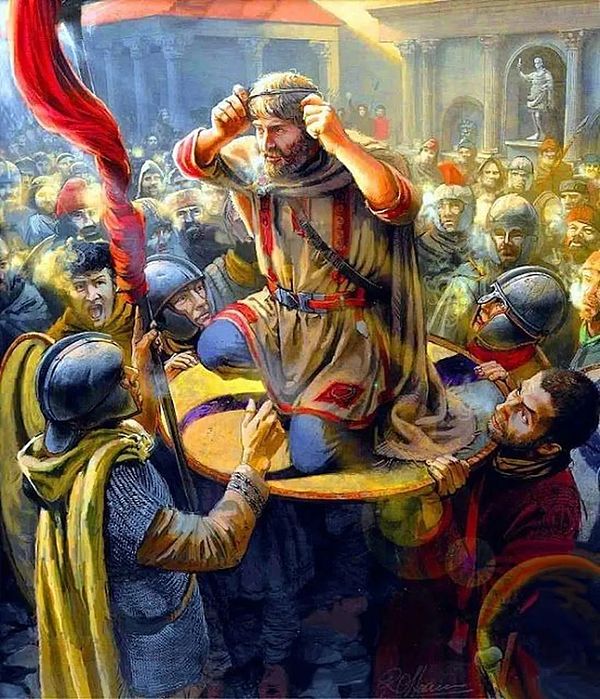
By the same token, if Trump's path of issuing currency can go according to his plan, the US presidential election may eventually go astray -
For example, a person announces his candidacy for president, and pleases the extreme people with an extreme policy platform. After the election is successful or even just creates a climate of dissent, he publicly announces "issuing currency", and then cuts a wave of leeks, achieves wealth freedom, and runs away.
Then politics will no longer be politics, and slogans, especially extreme slogans, will become tools for people with ulterior motives to make huge profits.
Although I believe that Trump himself is not interested in this - his goal is probably to take revenge on the Democratic and Republican establishment for what he has experienced in the past four years, to "cross the Rubicon" and then control the overall situation.
But there is no doubt that he will become the "initiator" in this regard - because he has opened up the exchange channel between politics and money that was originally impossible to open up. It has laid the seeds for more convenient institutional corruption in the United States.
Because - I might as well reiterate - any "convenient method" to circumvent the constraints of the existing system is always created by an ambitious careerist, and will eventually be distorted and corrupted by a group of greedy speculators.
What is the influence and appeal of a politician like the president?
It should be a social public tool. It is not influence that Trump yourself holds entirely by yourself. People support you, Trump, because you represent a certain political aspiration of quite a number of Americans.
However, when Trump cashes in this kind of social influence that is originally a public tool by issuing coins, the money he obtains and his financial power are private. Even if Trump reinvests this money into political activities through "Trump Coin", the political influence obtained by the conversion only represents his personal will.
This will be the most sophisticated "quasi-money laundering" (influence laundering) and the most blatant turning public into private.
Can the American system hold back Trump's rampage? It seems difficult at present.
It is true that Congress can pass laws like "The President or the President-elect is not allowed to issue meme coins." But such laws also need to be signed by the President and recognized by the Federal Supreme Court as not unconstitutional before they can take effect.
That is, it is necessary to pass through the three "cheese holes" of legislation, administration, and justice at the same time to finally achieve it and fill the gap in the system cage that the founding fathers of the United States could never dream of.
But at least during Trump's term, with his current influence and tenacity, he will definitely not allow such a self-defeating bill to pass.
What's more, issuing coins is probably just the first of a series of similar attempts by Trump in the future. Trump himself is a top smart businessman, and he has Musk's help. To be honest, I don't believe that a group of politicians can beat the team led by these two business geniuses.
So, a struggle between Inberado and the Senate over destroying the existing order and maintaining the existing order will begin with Trump's return to the White House.
And this will be a bet on the direction and destiny of the United States for hundreds of years to come.
Two thousand years ago, a very similar struggle took place in Rome, but with the Marius military reform, Caesar's crossing of the Rubicon River, and the call for a "new Caesar" at Caesar's funeral due to hunger and cold and Antony's sophistry, the Republicans were defeated by the Caesarists. Rome gradually transformed from the Republican era to the Empire, and then inevitably quickly corrupted, and finally ended absurdly with the barbarian guards selling the throne.
And this time, will the Republicans' resistance be more powerful and resolute? Or is the new Augustus heading for the coronation?
The overture is over,
the curtain of the theater is opening,
let's wait and see.
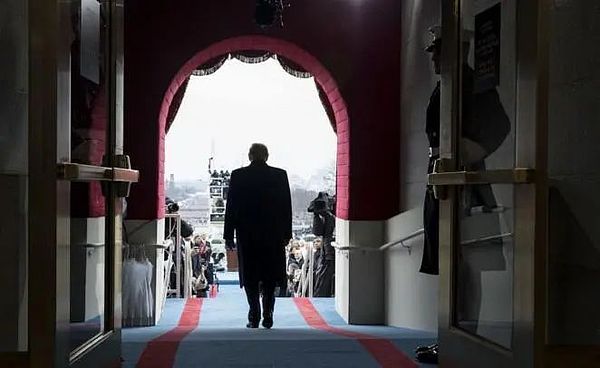
Explore the transformative journey of Bitcoin ETFs in the U.S. ETF market, outshining silver and challenging gold
 Miyuki
MiyukiUnderstand how Bitcoin's price, GBTC's strategic transitions, and the competitive landscape are reshaping investor strategies and the future of crypto investments.
 Brian
BrianExplore the remarkable 90% surge in Uma's token price following the announcement of Oval, a cutting-edge solution targeting MEV in lending protocols. Dive into the mechanics of MEV, Uma's strategic response, and the broader implications for the DeFi space.
 Weiliang
WeiliangDelve into the impact of ETFs, the ripple effects of Grayscale's moves, and the tumultuous journey of Bitcoin and altcoins amid market liquidations and traders' speculations.
 Miyuki
MiyukiUnravel Elon Musk's vision for an 'everything app' and dive into the community's reactions and speculations about the future of financial transactions on the platform
 Brian
BrianExplore Senator Marco Rubio's profound insights on BRICS's recent expansion and its implications for the SWIFT payment system, global sanctions, and the evolving world economic order
 Weiliang
WeiliangDelve into the intriguing case of Mark Scott, a lawyer embroiled in the OneCoin cryptocurrency scandal, facing contrasting sentencing proposals
 Miyuki
MiyukiExplore the monumental surge in Bitcoin's hash rate, surpassing 500 exahashes per second. Understand the implications for security, market dynamics, and the thriving ecosystem, as analysts and investors weigh in on this computational milestone.
 Brian
BrianExplore former President Donald Trump's staunch opposition to Central Bank Digital Currencies (CBDCs) and its implications on privacy, financial autonomy, and his broader economic agenda.
 Weiliang
WeiliangDelving into the U.S. SEC-Coinbase Legal Battle: Insights from the January 17 Hearing and Bloomberg Intelligence's Legal Perspective
 Miyuki
Miyuki